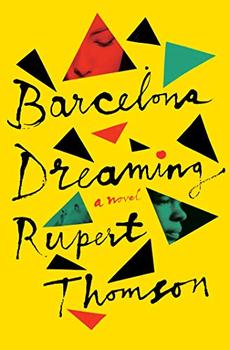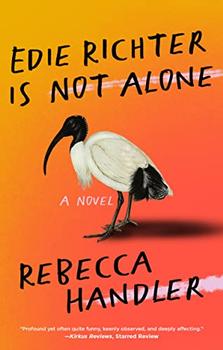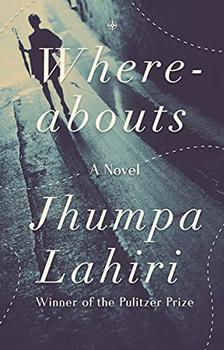Summary | Excerpt | Reviews | Beyond the book | Read-Alikes | Genres & Themes | Author Bio

Rupert Thomson's love for the titular city illuminates Barcelona Dreaming. It was the city in which the author lived for six years, where "the ordinary things were magical, a source of pleasure," but where, at the same time, "sophisticated urbanization faded into run-down concrete apartment blocks and burnt-out cars, areas of weed-choked waste-ground and pale dust," as he eloquently recalls in an essay for CrimeReads.
The novellas are narrated in turn by Amy, the owner of a gift shop; Ignacio, an alcoholic jazz musician; and Jordi, a translator. Even though each piece essentially stands alone, there are subtle strands linking the three narrators with each other as they traverse Barcelona. Shadowing their lives are the failures of past relationships, the intrusion of sexual and family violence (even if not made explicit), racism, and, anchoring the novel firmly within its time, the looming threat of the global financial crisis of 2008.
Perhaps the most substantial of the three novellas is the first — The Giant of Sarrià — narrated by Amy. Born in the north of England, and moving to Barcelona to be with her lover, Amy stayed on after they had separated because of "[t]he quality of the light first thing in the morning, so bright and clear that the buildings seem to have black edges." Within a few pages, the heart of Amy's story is reached. Woken during the night by "the sound of someone crying," Amy leaves her apartment to seek out the source. She finds in the car park a young man — aged about 19 or 20 — crying quietly "as if the misery ran deep." The young man is Abdel ben Tajah from Tangier, an undocumented migrant living in poverty at the end of the metro line, where "The paved area...was littered and desolate, and the facades of the buildings crawled with graffiti."
The second novella is the story of Ignacio — The King of Castelldefels — which demands attention from its first sentence: "I am lying on my back in someone's garden." Ignacio is an alcoholic, although not fully aware of it. His alcoholism is gradually revealed as he meanders his way through life and his relationship with a woman named Cristiani and her son Ari toward the story's denouement.
The third novella — The Carpenter of Montjuïc — narrated by Jordi, sets out his unrequited love for a woman named Mireia and his brush with Barcelona's underbelly through his friendship with Vic Drago — a shadowy English expatriate who disappears for periods of time and has a connection with the adult film industry. Both relationships inevitably lead to disappointment and disillusion. But the novella is dominated by the eponymous carpenter who seems to be almost magical and perhaps is a reminder of the mutability of reality. First appearing when Vic Drago orders a chest of drawers, then when Jordi visits the workshop, the carpenter — Daniel Federmann — exerts a hypnotic pull on both men, as "His gaze stretched...across the dark interior like a beam of light."
Subtly weaving a physical connection between the novellas — apart from their location in Barcelona — is a character named Montse. None of the narrators know one another, but Montse plays an important role with each. She is at once the best friend of Amy, the ex-wife of Ignacio, and the editor-in-chief of the publishing house that contracts translation assignments to Jordi.
Employing an interesting literary device, the author references in each novella the soccer player Ronaldinho who joined FC Barcelona in 2003 (see Beyond the Book). Amy's glimpse of his face on a billboard, his chance encounter with Ignacio, and the brief conversation about him between Jordi and a friend, each reference is a reflection of his constant presence in the hearts and minds of Barcelonians.
While the broad themes of racism, sexual and family violence, undocumented migration and unrequited love swirl beneath the novellas, of greater concern are the thoughts and emotions of the three narrators. As in all Rupert Thomson's critically acclaimed books, there is a fluidity in his writing that takes the reader places they never expected to go. Dreams and illusions are explored and broken, and at the end, the reader feels replete.
A marvelous book that evokes both the beauty and the shadows of Barcelona.
![]() This review
first ran in the August 18, 2021
issue of BookBrowse Recommends.
This review
first ran in the August 18, 2021
issue of BookBrowse Recommends.

If you liked Barcelona Dreaming, try these:

by Rebecca Handler
Published 2022
Funny, acerbic Edie Richter is moving with her husband from San Francisco to Perth, Australia.

by Jhumpa Lahiri
Published 2022
A marvelous new novel from the Pulitzer Prize winning author of The Lowland and Interpreter of Maladies--her first in nearly a decade.
Your guide toexceptional books
BookBrowse seeks out and recommends the best in contemporary fiction and nonfiction—books that not only engage and entertain but also deepen our understanding of ourselves and the world around us.